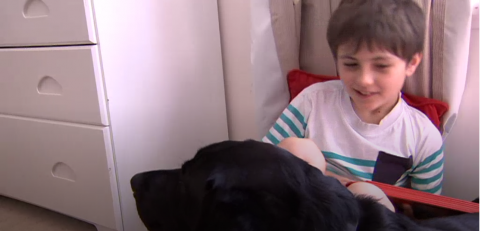
When Vanessa McKenzie attended school drop-off, along with the usual hazards of peak-hour traffic and stressed parents, she had to negotiate a clearer danger — her son Blake would bolt with no warning.
Key points:
- Autism assistance dogs are working dogs, similar to guide dogs for the blind
- They are connected to the child and trained to sit if they try to run off
- The canine relationship can also help a child's communication skills
"It was the worry of my day and made me so anxious," the Perth mother said.
Nine-year-old Blake, Mrs McKenzie's youngest son, has autism, relatively poor communication skills and a tendency to run.
"He would be holding my hand and want to suddenly run off to climb the tree over the other side of the car park or see if there's water down the drains, or whatever," Mrs McKenzie said.
"He would just sort of loosen from my grip and bolt off without telling me."
But not anymore.
A year ago Blake was matched with Poppy, a black Labrador specially trained by Guide Dogs WA for children with autism and their families.
When out of the home he can be tethered to the dog, which is trained to sit down when the tether is pulled, preventing him from running away.
 Photo: Poppy's presence helps Blake relax. (ABC News: Briana Shepherd)
Photo: Poppy's presence helps Blake relax. (ABC News: Briana Shepherd)
While Poppy's dark brown eyes and gentle nature would be a welcome addition for most households, it is the canine's ability to anchor Blake that has been particularly helpful.
"Now with Poppy he holds her handle and he likes holding her handle — he must get a nice sort of sensory feeling from that too — and basically if he wants to go off and see something she'll stop and anchor him," Mrs McKenzie said.
The relationship between boy and dog has even led to an improvement in Blake's communication.
"He is stopping and actually asking me where he wants to go, which is amazing," Mrs McKenzie said.
"He's coming out with pretty much the whole sentence most of the time, so yeah, it's fabulous."
Positive impact on the whole family
The McKenzies signed up to Assistance Dogs Australia about four years ago, when it was the only organisation in WA providing specially-trained canines for children with autism.
But the national program was in such demand that the wait list could stretch to years, so when the McKenzies heard of a new, local opportunity they jumped at the chance to be involved.
 Photo: Poppy's been embraced by the McKenzies, (from left) Campbell, Richard, Vanessa and Blake. (Supplied: Matthew Dwyer Photography)
Photo: Poppy's been embraced by the McKenzies, (from left) Campbell, Richard, Vanessa and Blake. (Supplied: Matthew Dwyer Photography)
"We were really lucky to be one of the first people to be on the list for the Guide Dogs WA program," Blake's father Richard McKenzie said.
Mrs McKenzie, who is the dog's main handler, had to undergo an intensive training schedule before Poppy was matched with her son, but said the impact had been immense.
"Our oldest son Campbell probably wasn't all that keen on dogs before," she said.
"But a week in and we all fell in love with her.
"She's a real joy, nice and calming for the whole family."
First and only program of its kind in WA
Guide Dogs WA has spent the past two years quietly perfecting its autism assistance dog (AAD) training program.
Space to play or pause, M to mute, left and right arrows to seek, up and down arrows for volume.
Video: Autism assistance dogs undergo strict training (ABC News)
"We assess our pups throughout their puppyhood and we're looking at their temperament," trainer Victoria Wilkinson said.
"For an autism assistance dog we tend to go for the more laid-back types. They need to be really relaxed in lots of different environments.
"But they've also got to have quite low distractions so they're able to focus.
"They tend to be a bit more lower-motivated, a bit more easygoing and of course they've got to be really relaxed around children."
Like guide dogs, which are specially trained to help the vision-impaired, autism assistance dogs are working animals trained for a specific purpose.
 Photo: Autism assistance dog trainee Harley will soon be matched with a family. (ABC News: Briana Shepherd)
Photo: Autism assistance dog trainee Harley will soon be matched with a family. (ABC News: Briana Shepherd)
While every child is unique, the program works to target some of the behaviours typically associated with autism.
"The key area is safety," Ms Wilkinson said.
"A lot of children will bolt or abscond, which makes it unsafe to go out for fear that they're going to run into the road.
"So the dogs are connected to the child and if the child bolts … our dogs are trained to sit, or lay down, and anchor to prevent the child from running away."
 Photo: Victoria Wilkinson says the dogs, like trainee Harley, are chosen for their easygoing nature. (ABC News: Briana Shepherd)
Photo: Victoria Wilkinson says the dogs, like trainee Harley, are chosen for their easygoing nature. (ABC News: Briana Shepherd)
It takes between six and ten months to train an autism assistance dog, at a cost of upwards of $50,000.
The dogs are gifted to families, with Guide Dogs WA also providing constant support services to make sure everyone involved is happy and healthy.
So far in WA, four of the specially-trained canines have been matched with families, but Guide Dogs WA services coordinator Jenny Gleeson said she expects that number will soon grow.
For more information visit www.guidedogswa.com.au.